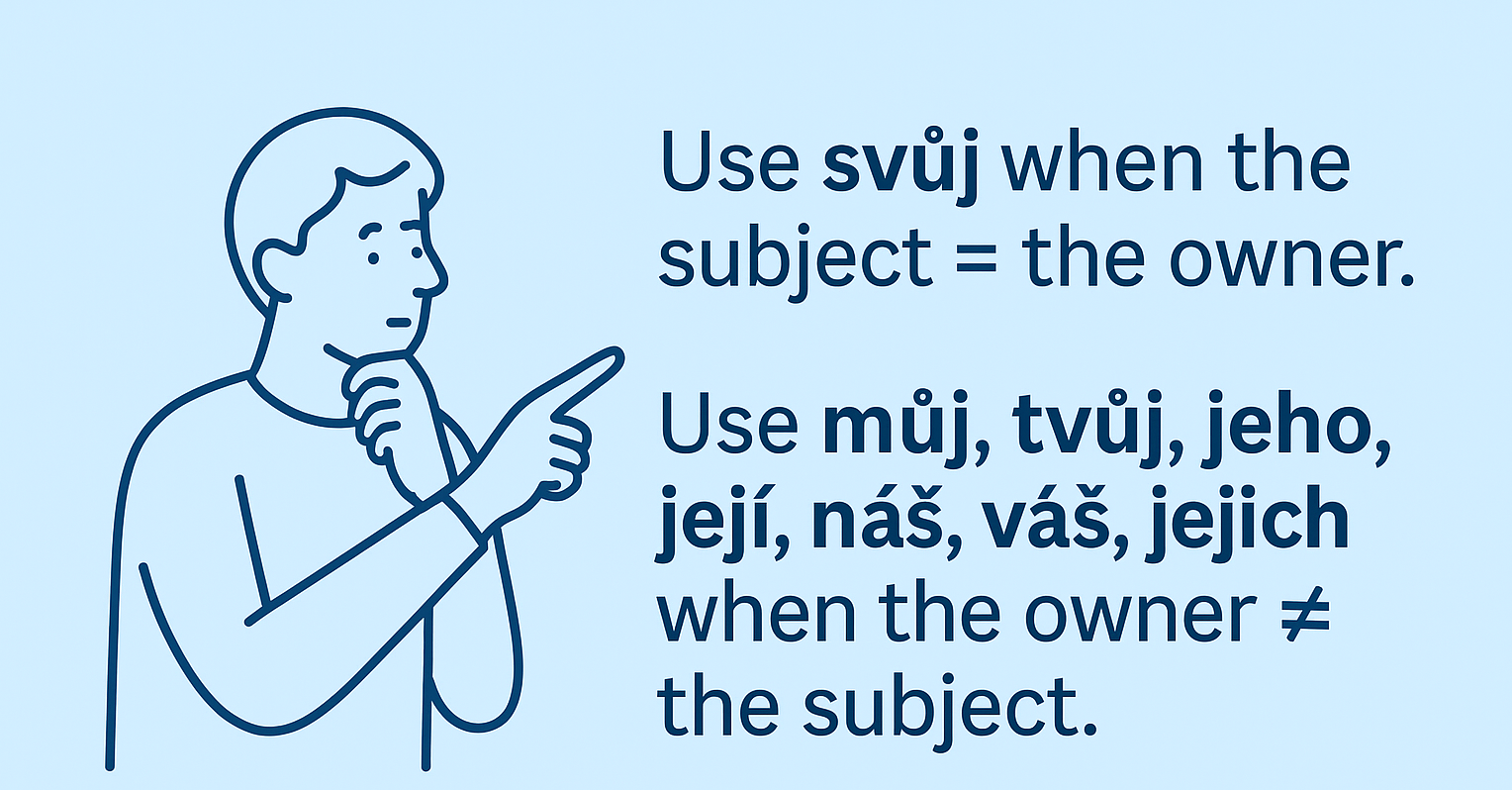Můj vs. Svůj: The Czech Pronoun Trap You Didn’t See Coming
If you’ve studied Czech for more than five minutes, you’ve probably met the word můj (my). Easy, right? But then comes its sneaky cousin svůj and suddenly you’re not sure if you’re calling your girlfriend or someone else’s.
This little difference can create some truly funny situations. Let’s break it down.
Why English speakers struggle
In English, we don’t have this distinction. We just say my car, his mom, her drink. That’s why Czech learners often sound ambiguous or even hilarious without meaning to. But in Czech, this difference really matters.
If the subject = the owner, you must use svůj.
If the owner ≠ the subject, you use můj, tvůj, jeho, její, náš, váš, jejich.
Think of svůj as a “boomerang pronoun”, It always comes back to the subject of the sentence. If the subject is the owner, use svůj. If not, stick to můj, jeho, její…
This difference really matters…
Want the full breakdown of Czech pronouns with declension tables and lots more examples? Use my Czech Pronouns Cheat Sheet, a your survival kit for all the little words that make a big difference.
Spot the difference of můj vs. svůj
Petr volá své přítelkyni.
Peter is calling his own girlfriend.Petr volá jeho přítelkyni.
Peter is calling someone else’s girlfriend. (Oh dear.)
Forms and Declension of svůj
Good news! You don’t have to learn a whole new set of endings for svůj. It follows the same pattern as můj (my).
That means: once you know můj, moje, mého… you can use svůj, svoje, svého… in the exact same way.
Just like můj (my), the pronoun svůj isn’t fixed. It changes its form depending on the noun that follows it. That means it has to agree in gender, number, and case with the thing you “own”.
svůj pes – my own dog (masc. sing.)
svou knihu – my own book (fem. sing., accusative)
své auto – my own car (neut. sing.)
svoje děti – my own children (plural)
So the magic of svůj is that it always points back to the subject, but its ending changes just like an adjective, following the noun it describes.
* both forms are possible
Real-life (and slightly awkward) examples
Imagine you’re at the airport:
Nezapomeň svůj pas! – Don’t forget your own passport.
If you say Nezapomeň můj pas! – Don’t forget my passport (oops, I’m not flying anywhere, but thanks).
At a party:
Dám si svůj drink na stůl. – I’ll put my own drink on the table.
Dám si jeho drink na stůl. – I’ll put his drink on the table (and probably start a fight).
In everyday life:
Každý má své problémy. – Everyone has their own problems.
Každý má její problémy. – Everyone has her problems (poor girl, must be exhausting!).
Practice makes perfect
Can you pick the right pronoun?
Petr má … telefon v kapse.
→ Petr má svůj telefon v kapse. – He has his own phone in his pocket.
Já hledám … klíče.
→ Já hledám svoje klíče. – I’m looking for my own keys.
Marie čte … knihu.
→ Marie čte svou knihu. – Marie is reading her own book.
But if you said Petr má jeho telefon or Marie čte její knihu… it sounds like Peter is carrying some other guy’s phone or Marie is reading another woman’s book.


